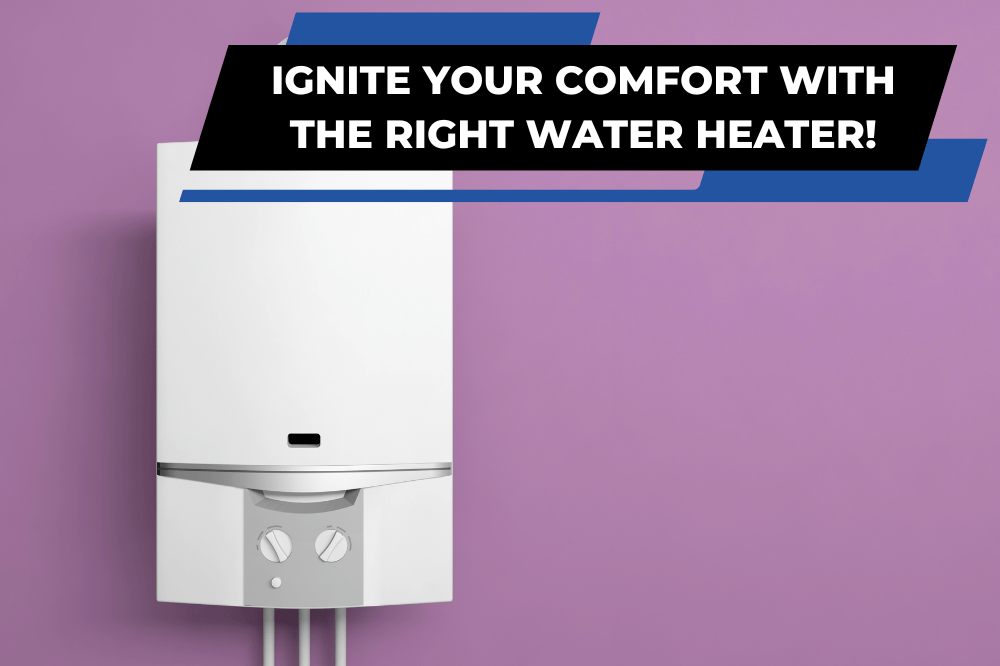Choosing the right water heater is a critical decision for every homeowner. Today, we’re focusing on an important debate – electric vs gas tankless water heater, comparing their benefits, drawbacks, and when each one might be the right choice for your home.
Understanding Tankless Water Heaters
Tankless water heaters, as their name suggests, heat water directly without the use of a storage tank.
When a hot water tap is turned on, cold water travels through a pipe into the unit, which either a gas burner or an electric element heats.
As a result, tankless water heaters deliver a constant supply of hot water. You don’t need to wait for a storage tank to fill up with enough hot water.
The Electric Tankless Water Heater
An electric tankless water heater operates by using electricity to heat water. Here’s what you need to know:
Benefits
- Ease of Installation: Electric models are smaller and can be installed in numerous locations around the home, including under sinks, closets, or in a basement.
- High Efficiency: With an energy efficiency of 98-99%, electric tankless water heaters can help lower your energy bills.
- Less Maintenance: With fewer components, these models require less maintenance.
- Safety: There’s no risk of gas leaks, increasing your home’s safety.
Drawbacks
- Operational Costs: Though efficient, electricity typically costs more per unit than gas, making these heaters more expensive to run.
- Power Requirements: They require significant amounts of electricity, so homes with older electrical systems might need an upgrade, which can be costly.
- Power Output: These models can’t heat water as quickly as gas models, which might not be ideal for larger households or heavy usage.
The Gas Tankless Water Heater
The gas tankless water heater, on the other hand, uses natural gas or propane to heat water. Here’s a breakdown of the pros and cons:
Benefits
- Lower Operational Costs: Natural gas is typically cheaper than electricity, making gas water heaters less expensive to operate.
- Higher Capacity: These heaters can heat water faster than electric models, making them a good choice for larger households.
- Reliability: A gas heater can still operate during power outages, providing hot water when you need it most.
Drawbacks
- Installation Costs: Gas models require venting, making them more complicated and more expensive to install.
- Energy Efficiency: Gas models are generally less efficient than electric models, with an average efficiency of 80-85%.
- Maintenance: Gas heaters have more components and require more maintenance.
- Safety Risks: These models come with a small risk of gas leaks, which can be mitigated with regular maintenance and inspections.
Electric vs. Gas – Which One is Right for You?
Now that we’ve covered the electric vs gas tankless water heater debate, it’s important to note that the right choice depends on your specific needs and circumstances. Here are some key considerations:
- Infrastructure: If your home doesn’t already have a gas line, installing one can be costly, making an electric model a better choice.
- Energy Costs: If electricity is cheaper in your area, an electric heater might be more cost-effective, but if natural gas is cheaper, a gas model could save you more in the long run.
- Hot Water Needs: Larger households or homes with high hot water demand might benefit more from a gas water heater because of its higher flow rate.
- Safety and Maintenance: If you prefer a unit with fewer safety concerns and less maintenance, an electric model might be best.
- Budget: Consider both the upfront cost and the long-term energy costs when deciding between an electric and a gas model.
Should You Switch to a Tankless Water Heater?
The decision to switch to a tankless water heater comes with several advantages. These systems provide an on-demand supply of hot water, which means you won’t have to wait for a storage tank to heat up.
Additionally, they can be more energy-efficient, which can save you money in the long run.
However, they also come with higher upfront costs, including the price of the unit itself and potentially expensive installation costs.
Therefore, it’s important to consider both the upfront and ongoing costs before making your decision.
Conclusion
Deciding between an electric vs gas tankless water heater involves evaluating your home’s infrastructure, energy costs in your area, your household’s hot water needs, and your budget.
Always consult with a professional (like our experienced team) to make an informed decision. Reach out to us today to discuss your water heater needs and schedule an installation!
Exceptional Plumbing Solutions with True Service Plumbing
When it comes to trusted plumbing services in Toronto and the GTA, both commercial and residential customers turn to True Service Plumbing. Our team of licensed professionals is committed to delivering efficient and high-quality solutions, whether it’s new installations, necessary system upgrades, or prompt repairs.
Considering a plumbing installation or need to troubleshoot your existing system? Our experts can guide you through the process, ensuring you choose the right solution tailored to your specific needs. We handle installations with minimal disruption to your property, prioritizing your comfort and satisfaction.
Don’t let plumbing concerns disrupt your day-to-day life. At True Service Plumbing, we strive to ensure your systems are always running at peak performance.
Reach out to True Service Plumbing today. We’re here to tackle your plumbing challenges swiftly, efficiently, and within your budget. Quality care, quality service – your peace of mind is our top priority. Leave the wet stuff to us!


